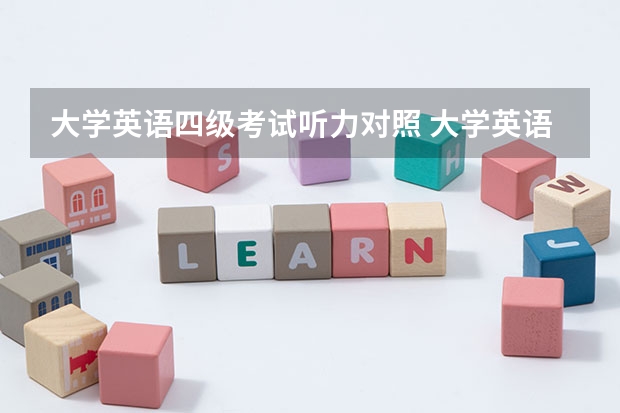大学英语四级考试听力对照 大学英语四级考试听力资料?
2023-09-16 09:27:33 | 金大话英语培训网

大学英语四级考试听力资料?
我们大学时候,听的四级英语听力不在少数,但是否会提升就要看个人努力了。下面是我给大家整理的大学英语四级考试听力,供大家参阅!大学英语四级考试听力素材
听力真题:
Section C
pound Dictation
puters are increasingly important in health care.But can they also help poor people escape 36 ______? Vikram Sheel Kumar thinks so. MisterKumar is a doctor, an engineer and the owner of a *** all business in Boston, Massachusetts. And, inSeptember, this 28-year-old received an 37 ______ for Technology in Service to Humanity, which came from Technology Review magazine.
His 38 ______ is to improve health care in poor nations with the help of puters *** allenough to hold in one hand. These devices are known as personal digital 39 ______ , orP.D.A.'s.
Doctor Kumar started his pany two years ago. It is called Dimagi, which means " *** art guy"in Hindi 北印度语. His parents came from India. There, Dimagi puter programs are used to40 ______ medical information on more than seventy thousand patients.
Doctor Kumar says health care workers had problems at first, but then learned quickly how touse the devices. Nurses no longer have to carry heavy 41 ______ whenever they travel to42 ______. And they no longer have to copy large amounts of health information by hand.
In South Africa, health workers are using a Dimagi program for a different purpose in theKwaZulu-Natal area. They use it to provide 43 ______ with results from tests for H.I.V., thevirus that causes AIDS. 44 ____________________________________________________________ .
Doctor Vikram Kumar says 45 _______________________________________________________ . He says 46 _______________________________________________________________ . And he urgespeople to suggest ways to improve it. Dimagi programs are written in code that is open toanyone.
答案解析:
答案解析:
36. poverty
解析:poverty n.贫穷,贫困,贫乏,缺少。不要漏写r。
37. award
解析:不定冠词后一定要用名词。不要和rewardn.报酬,奖金混淆。
38. goal
解析:物主代词后面一定是名词。不要误听成girl或go。
39. assistants
解析:不要漏掉表复数的s。
40. organize
解析:注意区别:be used to do sth.被用来做某事;used to do sth.过去常常做某事;be get used to doing sth.习惯于做某事。
41. documents
解析:别忘记在document后加s。
42. villages
解析:同样别忘记在village后加s。注意i和a的位置及双写l。
43. patients
解析:provide *** . with sth.为某人提供某物;不要漏掉patient后的s,也不要误以为是patience。
44. 标准答案:People who get tested must enter a secret identification code to see the results
听音关键:People, tested, enter a secret identification code, to see the results
答案重构:1 People tested must enter a secret ID code to see the results
2 People tested cannot see the results unless they enter a secret ID code
画龙点睛:who get tested作people的定语,可以简化为过去分词定语。enter a secret identification code稍有难度,若熟悉电脑操作及相关指令,应明白其含义,可以改为:need a secret ID number。
45. 标准答案:it is important to get patients involved in their own health care by helping them gain information
听音关键:important, to get patients involved, health care, help them gain information
答案重构:1 we must make patients fully informed so that they can be involved in their own health care
2 it is vital that patients gain information and get involved in their own health care
画龙点睛:句子结构it is important to...比较简单,get...involved in是一个常用短语,their own health care是本文的主题第1句就有,by后面的方式状语也没有复杂单词。总之,本句宜尽量照搬原文。当然,也可以换一种方式表达,比如用主语从句从句中须用should do虚拟语气。
46. 标准答案:there are endless possible uses for this technology, especially in developing countries
听音关键:endless possible uses for this technology, developing countries
答案重构:this technology may be used widely, especially in developing countries
画龙点睛:there be句型。endless possible uses都是常见词,不难拼写。可能technology和especially稍难,容易写错。
大学英语四级考试听力练习
听力真题:
Passage Two
29.
A. 10.7 hours.
B. 4.1 hours.
C. 3.1 hours.
D. 5.35 hours.
30.
A. China.
B. Japan.
C. The U.S.
D. The Philippines.
31.
A. Friends and neighbors.
B. Teachers and friends.
C. Parents and friends.
D. Parents and grandparents.
答案解析:
Passage Two
[29]Indians are the world's biggest bookworms,reading on average 10.7 hours a week, twice as longas Americans, according to a new survey. The NOPWorld Culture Score index surveyed 30,000 people in30 countries from December 2004 to February 2005.Analysts said the spirit of self-help could explainIndia's high figures. Time spent on reading meantfewer hours watching TV and listening to the radio-India came fourth last in both. [30]The NOPsurvey of 30,000 consumers aged over 13 saw China and the Philippines take second and thirdplace respectively in average hours a week spent reading books, newspapers and magazines.Britons and Americans scored about half the Indians' hours and Japanese and Koreans wereeven lower-at 4.1 and 3.1 hours respectively. R. Sriram, chief executive officer of CrosswordsBookstores, a chain of 26 bookshops around India, says "For Indians, reading is afundamental part of their being." "They place a great deal of emphasis on reading. That's thereason why they do well in education and universities abroad," he said. "People educatethemselves and deal with change throughout their lives. And the way to do that is to updatethemselves with books." Mr. Sriram says social changes have also made a difference: [31]"Earlier people often turned to their parents and grandparents for advice. Now they turn tobooks."
Questions 29 to 31 are based on the passage you have just heard.
29. How many hours on average do Americans read a week according the survey?
正确答案:D
解析:短文第1句话就说:印度人是世界上最爱读书的人了,他们平均每周读书10.7小时,是美国人的两倍。因此美国人每周读书5.35小时,即D。数字题。选项所指的含义需要做记号,A指印度,B指日本,C指韩国,D指美国。据此,一听到问题,答案就信手拈来了。
30. Which country takes the second place in average hours a week spent reading books?
正确答案:A
解析:短文称:NOP调查了3万名年满13岁的消费者,发现按每周花在阅读收报杂志的时间来排名,中国和菲律宾分别名列第2和第3。本题问排名第2的国家,故A正确。语义强调之处出题:本文比较不同国家的人们的阅读习惯,有比较的内容应特别留意。
31. Who did Indians often turn to for advice in the past?
正确答案:D
解析:短文最后说:“过去人们从父母和爷爷奶奶那里寻找建议和忠告。”故选D。本题各个选项为并列名词,问细节。这种题目最容易解答,符合短文听力“听到什么选什么”的解题原则。此外,短文结尾处常设考点。
大学英语四级考试听力材料
听力真题:
Section B
Passage One
26.
A. He jumped to the mouth of the well from thegoat's back.
B. He came out by pulling the horn of the goat.
C. He climbed to the mouth of the well by himself.
D. He swam out of the well when the water was rising.
27.
A. The water was sweet.
B. The water had saved his life.
C. He wanted to lure the goat to descend.
D. He wanted to fort the goat.
28.
A. One is never too old to learn.
B. Look before you leap.
C. A friend in need is a friend indeed.
D. The early bird gets the worm.
答案解析:
Section B
Passage One
A fox one day fell into a deep well and could find no means of escape. A thirsty goat came to the same well, and seeing the fox, inquired if the water was good. [27]Concealing his sad situation under a merry guise, the fox sang high praise of the water, saying it was excellent beyond measure, and encouraging him to descend. The goat, mindful only of his thirst, thoughtlessly jumped down, but just as he drank, the fox informed him of the difficulty they were both in and suggested a scheme for their mon escape. "If," said he, "you will place your forefeet upon the wall and bend your head, I will run up your back and escape, and will help you out afterwards." [26]The goat readily assented and the fox leaped upon his back. Steadying himself with the goat's horns, he safely reached the mouth of the well and made off as fast as he could. When the goat blamed him for breaking his promise, he turned around and cried out, "You foolish old fellow! If you had as many brains in your head as you have hairs in your beard, [28]you would never have gone down before you had inspected the way up, nor have exposed yourself to dangers from which you had no means of escape."
Questions 26 to 28 are based on the passage you have just heard.
26. How did the fox e out of the well?
正确答案:A
解析:短文提到,狐狸跳上了山羊的背。利用山羊角站稳,然后安然地到了井口,并迅速地逃离。可见狐狸是从山羊背上跳出井口的,故A正确。山羊不是在井外,狐狸抓住山羊角也不可能爬出井,B不对;C、D很容易排除。对于故事性短文,可以先大体浏览一遍题目,看题目可能问到什么内容,然后认真听故事,尽量把听到的资讯在脑海里转化为画面,最后再根据问题答题。对故事情节想象得越清楚,解题就越容易。
27. Why did the fox sing high praise of the water?
正确答案:C
解析:短文提到,狐狸大赞井水的好处,说它妙不可言,一再诱使山羊下井。故C正确。A、B以The water为主语,C、D以He wanted开头。本题可能问“水”怎么样,也可能问“他”有什么动机;根据故事的大致情节,听到问题应能很快判断出C正确。“与主题相关的选项正确。”
28. What does the story try to tell us?
正确答案:B
解析:结尾处狐狸的话揭示了故事的寓意:在检查是否有退路之前,绝不可贸然行事;绝不要陷入你无法从中解脱的险境。B“三思而后行”即是此寓意的高度概括。四个选项都是谚语,本题应当问哪一条谚语与这则寓言最贴切。从山羊的遭遇中,可以自然地得出B的结论。
看过大学英语四级考试听力的人还:

英语四级听力分数分布明细
英语四级听力分数分布明细如下:
听力:25分钟,35%(占整套试卷的比例)=248.5分,149分及格听力分为三部分。
SectionA测试内容:短篇新闻三段,测试题型:选择题单选,分值比例:7%=49.7分(每题7.1分)。
SectionB测试内容:长对话两篇,测试题型:选择题单选,分值比例:8%=56.8分(每题7.1分)。
SectionC测试内容:听力篇章三篇,测试题型:选择题单选,分值比例:20%=142分(每题14.2分)。
四级阅读分值:
阅读理解:40分钟,35%(占整套试卷的比例)=248.5分,149分及格。
四级翻译作文分值:
写作:30分钟,15%(占整套试卷的比例)=106.5分,63.9分及格。翻译(汉译英):30分钟,15%(占整套试卷的比例)=106.5分,63.9分及格。
英语四级考试流程:
1、8:45分开始入场,准考证,学生证,身份证三证齐全,手机关机放在考场外,入场后按准考证上的座位号入座,按监考员要求在考场座位表上规定的位置签字,此时可以拿出耳机提前进行试音。
2、9点左右开始下发考试材料,检查试题册、条形码、答题卡的印刷质量,在试题册和答题卡上填写好自己的信息,同时要记得粘贴条形码。
3、9点10分考试正式开始,考生开始作答作文。
4、9点40分听力考试正式开始,考生注意及时填涂答题卡1。
5、10点10分听力考试结束,监考老师收回答题卡1。
6、10点15分考试继续进行,考生继续完成阅读理解和翻译部分。
7、11点25分考试结束,监考老师收回试题册及答题卡2。
8、等待监考老师收完所有试题册及答题卡并清点好数量方可离开。

英语四级听力分值分布
英语四级听力分值分布情况如下:
英语四级听力总分累计是248.5分,其中包括三个部分,分别是短篇新闻、长对话、听力篇章。
其中短篇新闻有7个小题目,每个题目是7.1分,也就是说这个部分分值是7.1*7=49.7分;长对话是8个小题目,每个题目也是7.1分,分值是7.1*8=56.8分;听力篇章部分包含了10个小题,每个题目是14.2分,分值是14.2*10=142分。
英语听力分值占了四级考试总分值的35%,因此对结果的影响还是很大的。
大学英语四级考试是由中华人民共和国教育部主办,中华人民共和国教育部教育考试院(原教育部考试中心)主持和实施的大规模标准化考试,是全国性的教学考试。 金大话英语培训网
其目的是促进中国大学英语教学工作,对大学生的英语能力进行客观、准确的测量,为提高中国大学英语课程的教学质量提供服务。
考试的主要对象是根据教育大纲修完大学英语四级的在校专科生、本科生或研究生。大学英语四、六级标准化考试自1986年末开始筹备,1987年正式实施。
国家教育部委托“全国大学英语四、六级考试委员会”(1993年名为“大学英语四、六级标准化考试设计组”)负责设计、组织、管理与实施大学英语四、六级考试。
以上就是金大话英语培训网小编给大家带来的大学英语四级考试听力对照 大学英语四级考试听力资料?,希望能对大家有所帮助。
大学英语四级考试听力及答案23年6月大学英语四级考试听力解析,22-25题,附原文中文翻译2023年6月大学英语四级考试听力部分,第22-25题,原文是关于午睡价值的科技小文,难度不大,和高考英语听力最后一篇的难度差不多,在大学听力考试里面,应当算作是送分题了。全文一共出现14处影响理解的词组短语固定用法和难词偏词,《高中英语1.5万考点》和《睡眠记忆法配套词表》全部命中。

大学英语四级考试听力及答案23年6月大学英语四级考试听力解析,22-25题,附原文中文翻译2023年6月大学英语四级考试听力部分,第22-25题,原文是关于午睡价值的科技小文,难度不大,和高考英语听力最后一篇的难度差不多,在大学听力考试里面,应当算作是送分题了。全文一共出现14处影响理解的词组短语固定用法和难词偏词,《高中英语1.5万考点》和《睡眠记忆法配套词表》全部命中。

大学英语四级考试听力真题原文下面是我整理的大学英语四级考试听力真题原文,希望对大家有帮助。2013年6月大学英语四级真题-听力原文PartIIIListeningComprehensionSectionADirections:Inthissection,youwillhear8shortconversationsand2longconversations.Att

2019年大学英语四级听力考试题(1-3)2019年大学英语四级听力考试题(2)SectionA1.A)Shewillgopurchasethegiftherself.B)Thegiftshouldnotbetooexpensive.C)Themanisnotgoodatbalancinghisbudget.D)TheyaregoingtoJane’sh

谁知道英语四级考试听力下载地址啊??急用历年大学英语四六级听力mp3格式下载历年四级听力MP3的下载地址为:(用鼠标点击右键用迅雷下载或目标另存为)2000年1月为:_200001.mp32000年6月为:_200006.mp32001年1月为:_200101.mp32001年6月为:_200106.mp32002年1月为:_200201.mp3

大学英语四级考试听力资料?我们大学时候,听的四级英语听力不在少数,但是否会提升就要看个人努力了。下面是我给大家整理的大学英语四级考试听力,供大家参阅!大学英语四级考试听力素材听力真题:SectionCpoundDictationputersareincreasinglyimportantinhealthcare.Butcantheyalsohelppoorpeopl

大学英语四级考试听力资料?我们大学时候,听的四级英语听力不在少数,但是否会提升就要看个人努力了。下面是我给大家整理的大学英语四级考试听力,供大家参阅!大学英语四级考试听力素材听力真题:SectionCpoundDictationputersareincreasinglyimportantinhealthcare.Butcantheyalsohelppoorpeopl

大学英语四级考试听力资料?我们大学时候,听的四级英语听力不在少数,但是否会提升就要看个人努力了。下面是我给大家整理的大学英语四级考试听力,供大家参阅!大学英语四级考试听力素材听力真题:SectionCpoundDictationputersareincreasinglyimportantinhealthcare.Butcantheyalsohelppoorpeopl
- 2023年6级考试时间下半年 四级报名截止时间2023下半年 北京四六级报名时间2023下半年
- 求六级百度网盘资源😭😭 求大学英语四级历年真题下载地址,有没有好的推荐 我需要 四六级历年真题,百度网盘的链接有没有呀~求哥哥姐姐们分享
- 英语四六级大学几年级考 大学几年级可以考英语四级 四六级大几可以考
- 英语四六级考试作弊会有什么后果啊!
- 12月大学英语六级作文题目及范文(大学英语四六级考试写作题型分析及范文(5))
- 广东省四六级报名时间(广东英语四级考试时间)
- 广东省2022年下半年四六级英语考试疫情防控要求 辽宁2022下半年英语四六级口语考试考生防疫须知 六级考试核酸要求
- 英语六级多少分算及格?
- 江苏省四级考试时间 江苏四六级考试时间2023年下半年 江苏省2023年四六级考试时间
- 湖北四六级考试时间2023下半年(下半年湖北英语四六级考试安排)
- 全国大学英语四、六级考试的网址是什么?
- 每年四六级考试时间? 四六级出处 英语四级考试时间,英语六级考试时间
-
 大学英语四级模拟考试时间 全国大学生英语四六级考试时间几点
大学英语四级模拟考试时间 全国大学生英语四六级考试时间几点2023-09-26 16:32:43
-
 如何注册大学英语四级考试 英语4级如何报名
如何注册大学英语四级考试 英语4级如何报名2023-08-31 11:17:41
-
 2019年上半年全国大学英语四级考试成绩查询 6月英语四级成绩查询时间
2019年上半年全国大学英语四级考试成绩查询 6月英语四级成绩查询时间2023-08-30 22:51:35
-
 英语四级大学宿舍要求多少 英语四级报考要求
英语四级大学宿舍要求多少 英语四级报考要求2023-09-30 05:26:14
-
 中北大学英语四级考试时间 英语四级具体考试时间表
中北大学英语四级考试时间 英语四级具体考试时间表2023-09-25 10:06:26
-
 往年大学英语四级考试成绩 怎样查询英语四级过往成绩单?
往年大学英语四级考试成绩 怎样查询英语四级过往成绩单?2023-09-21 21:19:53